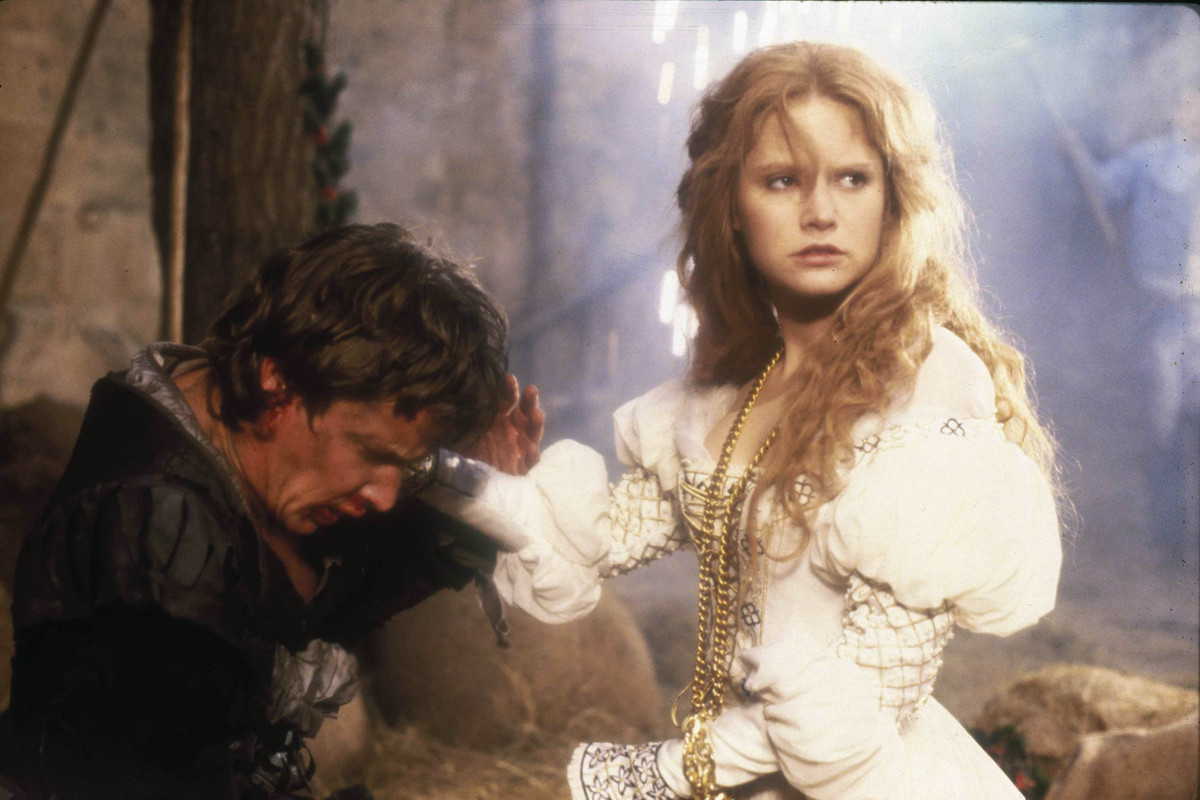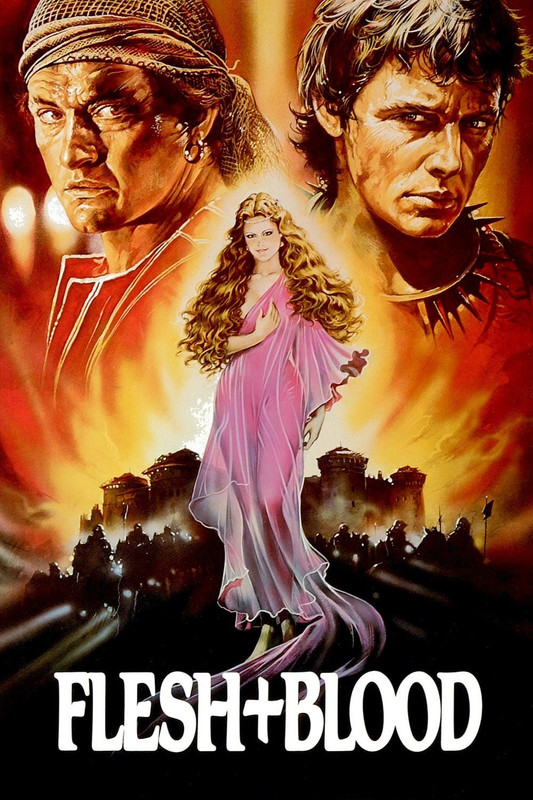I have just rewatched Paul Verhoeven's Showgirls which, 20 years after its release, seems to be attracting a new critical appreciation. I still think it's pretty dreadful, and easily Verhoeven's worst film.
For me, the Verhoeven film that is most in need of reappraisal and a bigger audience is his 1985 English language début, Flesh + Blood. What follows is a piece originally written as a review of the US Blu Ray release for the blog of the now defunct Vérité film magazine.
Flesh + Blood is a film that would seem to epitomise the idea of doing exactly what it says on the tin. The course of its running time is split relatively evenly between Jennifer Jason Leigh's flesh, and the blood dripping from the swords of Rutger Hauer and his band of mercenaries. If that were all that Flesh + Blood were offering it'd still be a lot of fun, but coming from Paul Verhoeven, the master of finding substance in schlock, it's so much more than a boobs n' gore-filled guilty pleasure.
In Italy, 1501, Martin (Hauer) and his battle-born warriors are left unpaid by their employer Arnolfini (Fernando Hilbeck) after a claret-soaked conflict. In retaliation they kidnap Agnes (Leigh), the betrothed of Arnolfini's son Stephen (Tom Burlinson), and following a route indicated by a statue of St Martin, take an abandoned castle as their new home. Wanting vengeance and his bride back, Stephen pursues them and lays siege to the castle. These are the bloodied bones of a story that Verhoeven and co-screenwriter Gerard Soeteman pick clean before sharpening them into a set of themes that cut as deep as any of Martin's blades.
In his first English-language film, Verhoeven explores the tendency of power to corrupt, and the abuse of authority by those who hold it, a preoccupation that has informed almost all his subsequent work from Robocop to Black Book. In this sixteenth-century setting, power and authority rest largely with the church, and particularly with Ronald Lacey's easily influenced priest. The film's original suggested title was 'God's Own Butchers', an accusation Verhoeven makes not only of the priest but of Martin, seemingly drunk on the power that his followers belief in St Martin confers on him. The most rational of the group, he sees through the priest's pronouncements but goes along with them to secure his position as leader.
To Verhoeven, the coveting of power and control are basic instincts as hardwired as our sexual urges. Scenes between Martin and the kidnapped princess Agnes are similarly predicated on animal attractions. When we are first introduced to Agnes she is nervous and excited about meeting Stephen, less for getting to know him and more for where it will eventually lead. Her curiosity about sex is such that she orders her maid to seduce another member of their party, so that she can watch.
The extensive nudity is exploitation typical of the randy Dutch director, but with that exploitation comes Agnes' understanding of her doll-like beauty and how to use it in a world of brutes. Raped soon after she is kidnapped, even on her back, Agnes is still the one who wields the power, seemingly hypnotising Martin as he has his way with her and undermining his dominance enough so he is the only one who attacks her. Winning a type of protection, she also gains influence with the savage and watching her manipulations is almost as uncomfortable as witnessing the violation of her body.
The MPAA demanded cuts of course, which Verhoeven details in his commentary before noting with relish that this is the uncut version, but what might have so easily offended works as a wily clash of egos and varying degrees of intelligence, thanks to captivating casting. During shooting, Verhoeven fell out with Rutger Hauer, who'd been his on-screen alter ego up to that point, and they never worked together again. In their final collaboration, Hauer is as good as he's ever been, credibly buffed up as a warrior and charismatic as a leader of men. Martin's unredeemed arrogance, encouraged by the priest's repeated assertions that he has been appointed by God to lead them, is a trait Hauer makes innate without indulging.
 Jennifer Jason Leigh spent much of her early career elevating sleaze with her talent, and Flesh + Blood is a fine example of that. While she struggles with an English accent, Agnes' enticing ambiguities are all behind the dialogue. The division of her loyalties is externalised in Leigh's body language, her scheming physicalised, as she writhes this way and that during the sex scenes. Calculating especially when copulating, Agnes looks for weakness and advantage wherever possible. Just watch Leigh as she decides whether or not to stop Martin from eating a particular piece of meat late in the film; the ruthless streak running through Agnes is nakedly on display, in or out of bed.
Jennifer Jason Leigh spent much of her early career elevating sleaze with her talent, and Flesh + Blood is a fine example of that. While she struggles with an English accent, Agnes' enticing ambiguities are all behind the dialogue. The division of her loyalties is externalised in Leigh's body language, her scheming physicalised, as she writhes this way and that during the sex scenes. Calculating especially when copulating, Agnes looks for weakness and advantage wherever possible. Just watch Leigh as she decides whether or not to stop Martin from eating a particular piece of meat late in the film; the ruthless streak running through Agnes is nakedly on display, in or out of bed.
Tom Burlinson is a blander presence against two strong leads but still manages to make something of Stephen, who's a thinker, not a warrior, only discovering his inner steel after Agnes is taken. His intelligence is a trait Verhoeven has fun with, inventing gadgets that play into the film's action scenes - a mobile bomb in the film's opening siege leaves no doubt over Stephen's ingenuity, and later his smarts are responsible for a disgustingly realised depiction of early germ warfare. The rest of the supporting cast is colourfully eclectic, giving the film more than two-tone mud and plasma. Ronald Lacey and Susan Tyrell are on especially fine form, while an amusingly confused Bruno Kirby is completely miscast.
On his typically forthright and story-packed commentary, Verhoeven lets us know just how hellish a film it was to make, but Flesh + Blood's verve and lack of compromise allowed the director to propel himself into the Hollywood big leagues with his follow up, Robocop. Every bit as violent as that era-defining sci-fi, the stench of battle emanates from every frame, Jan DeBont, then Verhoeven's regular cinematographer (who went on to direct nineties action classic Speed, then killed that career with Speed 2: Cruise Control), keeps the film at ground level, giving it a grimy, gritty look that's overwhelming in HD even if it's not as dirty as the ugly verisimilitude of VHS.
A film you wallow in as much as watch, Verhoeven's most underrated work evokes an unpleasant reality that's raw without being softened by the pulp of the films that followed.
★★★★
★★★★


No comments:
Post a Comment